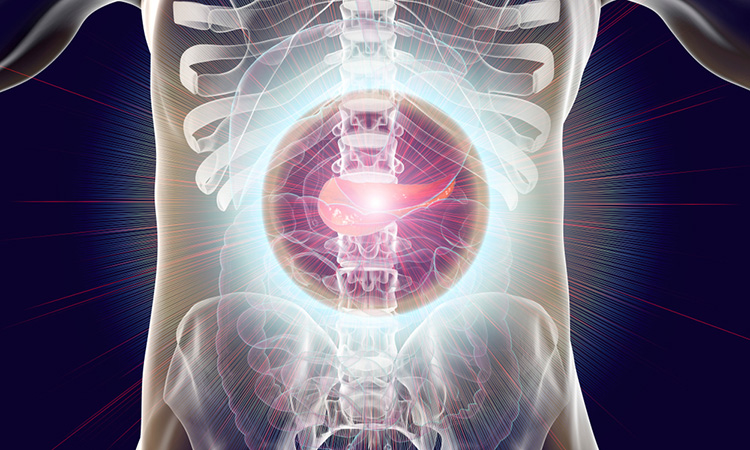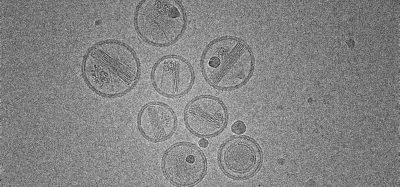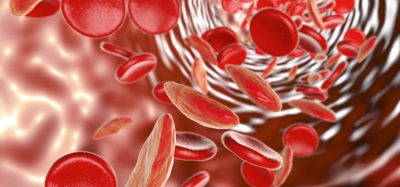New dual-targeting strategy shows promise in treating pancreatic cancer
Posted: 7 May 2025 | Drug Target Review | No comments yet
Researchers at the University of Michigan have discovered a powerful combination therapy that eradicates pancreatic tumours in preclinical models, offering hope for new treatments against one of the most treatment-resistant cancers.


Pancreatic cancer remains one of the deadliest forms of cancer, with a five-year survival rate of just 13 percent. The high mortality rate stems largely from a lack of effective treatment options and the aggressive biology of pancreatic tumours, particularly pancreatic ductal adenocarcinoma, the most common and challenging subtype to treat.
A new study published in Nature by researchers at the University of Michigan offers a potential breakthrough: targeting both PIKfyve and Kirsten Rat Sarcoma- Mitogen Activated Protein Kinase (KRAS-MAPK) pathways eliminated tumours in preclinical human and mouse models.
Understanding the tumour environment
Pancreatic tumours are notoriously complex and largely composed of non-cancerous cells. In some cases, only 10% of the tumour mass is made up of actual malignant cells. This unique microenvironment, combined with poor blood vessel function, deprives cancer cells of nutrients, forcing them to activate alternative survival mechanisms. These cells adapt by recycling internal resources, importing nutrients through specialised transporters, and evading immune detection.
Automation now plays a central role in discovery. From self-driving laboratories to real-time bioprocessing
This report explores how data-driven systems improve reproducibility, speed decisions and make scale achievable across research and development.
Inside the report:
- Advance discovery through miniaturised, high-throughput and animal-free systems
- Integrate AI, robotics and analytics to speed decision-making
- Streamline cell therapy and bioprocess QC for scale and compliance
- And more!
This report unlocks perspectives that show how automation is changing the scale and quality of discovery. The result is faster insight, stronger data and better science – access your free copy today
“Even though these malignant cells don’t have access to blood-derived nutrients because of dysfunctional blood vessels, they survive by turning on different processes.” explained Dr Costas Lyssiotis, Maisel Endowed Professor of Oncology at the University of Michigan and co-director of the Rogel and Blondy Center for Pancreatic Cancer.
PIKfyve: A new therapeutic target
Lysosomes, responsible for recycling worn-out cellular components, are central to the survival of pancreatic cancer cells. Despite their significance, no approved therapies currently target lysosomes in pancreatic cancer.
Lysosomes, responsible for recycling worn-out cellular components, are central to the survival of pancreatic cancer cells
The researchers zeroed in on PIKfyve, an enzyme that regulates lysosomal function and has been a therapeutic target in blood cancers. Although PIKfyve inhibitors have passed phase I clinical trials in other cancers, their potential in pancreatic cancer was unexplored, until now.
Using genetically engineered mouse models, the researchers found that mice lacking the PIKfyve gene developed fewer cancers. Additionally, treating mice with PIKfyve inhibitors, apilimod and ESK981, significantly reduced tumour growth after 10 weeks.
Disrupting lipid metabolism in cancer cells
To determine how PIKfyve influences tumour metabolism, the researchers studied human pancreatic cancer cell lines. They discovered that PIKfyve is essential for recycling fats within the lysosomes. Inhibiting this enzyme forced cancer cells to produce their own fats, a much more energy-intensive process.
The production of new fats is driven by the KRAS-MAPK pathway, a well-known driver of pancreatic cancer. “KRAS is the master regulator of pancreatic cancer, and new medicines are now in clinical trials to bring down this kingpin,” said Lyssiotis.
While the introduction of KRAS inhibitors marked a major milestone in the field, cancer cells eventually developed resistance. This illustrates the need for combination approaches, further illuminating the potential of PIKfyve inhibitors.
A potent combination: PIKfyve and KRAS inhibition
The study revealed that blocking PIKfyve disrupts lipid recycling, while inhibiting KRAS simultaneously prevents cancer cells from compensating by making new fats. This dual blockade effectively shuts down two vital metabolic routes.
Yuanyuan Qiao, research assistant professor of translational pathology and co-author of the study, emphasised: “We definitively demonstrated the critical role of the PIKfyve gene in KRAS-driven pancreatic cancer.”
The results showed that in several advanced preclinical models, this combination therapy completely cured mice of pancreatic cancer.
Toward a more complete cure
“The most exciting aspect of our findings is the discovery of a novel strategy to rewire lipid metabolism and significantly enhance the efficacy of KRAS inhibitors—therapies already approved for pancreatic cancer treatment,” said Dr Arul Chinnaiyan, S.P. Hicks Endowed Professor of Pathology and Urology and co-author
The next steps are overcoming the cancer cells’ backup mechanisms and resistance pathways. The researchers now aim to recruit the immune system to eliminate residual tumour cells that survive the combination therapy.
“These cancer cells have perfected their ability to develop backup pathways, all of which we have tried to shut down in this study,” Lyssiotis said. “We believe that recruiting the immune system to target the surviving tumours will be the missing piece of the puzzle.”
Related topics
Cancer research, Drug Discovery, Drug Discovery Processes, Drug Targets, Oncology, Therapeutics, Translational Science
Related conditions
Pancreatic cancer
Related organisations
the University of Michigan








